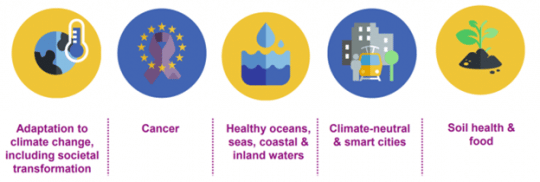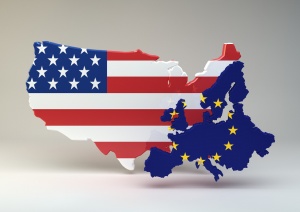
Climate change and environmental degradation are an existential threat to Europe and the whole world. The European Green Deal is a response to such challenges. It is a new growth strategy that aims to transform the EU into a fair and prosperous society, with a modern, resource-efficient and competitive economy where there are no net emissions of greenhouse gases in 2050 and where economic growth is decoupled from resource use.
What are the transformative policies for a sustainable future?
- Increasing the EU’s climate ambition for 2030 and 2050; become climate-beutral by 2050.
- Decarbonise the energy sector (The production and use of energy account for more than 75% of the EU’s greenhouse gas emissions).
- Renovate buildings to help people cut their energy bills and energy use (40% of our energy consumption is by buildings).
- Support industry to innovate and to become global leaders in the green economy (European industry only uses 12% recycled materials).
- Roll out cleaner, cheaper and healthier forms of private and public transport (Transport represents 25% of our emissions).
Horizon Europe -in synergy with other EU programmes- fosters new technologies, sustainable solutions and disruptive innovation across Europe and the world. The powerful instruments and innovative governance of Horizon Europe are set to drive the necessary systemic changes to reach climate neutrality and ensure an inclusive ecological and economic transition. To place research and innovation into a new role and to bring concrete solutions to some of our greatest challenges, EU missions -a novelty in the Horizon Europe- were specifically introduced for the years 2021-2027. They have ambitious goals with a target to deliver concrete results by 2030, and 4 out of the 5 mission areas directly support the European Green Deal:

- Restore our ocean and waters
- Climate-neutral and smart cities
- A soil deal for Europe
- Adaptation to climate change and societal transformation
In order to help achieving the aforementioned goals, more than €53 billion is allocated to pillar-2 ‘Global Challenges and European Industrial Competitiveness’ of Horizon Europe with the aims to turn the results of excellent research into innovative solutions to improve citizens daily lives by tackling global challenges. The pillar-2 is established through clusters of research and innovation activities that encourages cross-disciplinary, cross-sectoral, cross-policy and cross-border collaboration in pursuit of the Sustainable Development Goals by following the principles of the 2030 Agenda for Sustainable Development, the Paris Agreement adopted under the United Nations Framework Convention on Climate Change and the competitiveness of the Union’s industries.
Furthermore, Green Charter is also implemented in the MSCA programme under pillar-1, where topics are chosen freely by the applicants and the main drivers are scientific excellence and innovation, to promote the sustainable implementation of research activities. The Green Charter is in line with the goals of the European Green Deal, the United Nation’s 2030 Agenda and the Sustainable Development Goals. It is a code of good practice for individuals as well as institutions, who are in receipt of MSCA funding and all participants are expected to adhere to the Green Charter on a “best effort” basis and to commit to as many of its provisions as possible during the implementation of their projects. At final reporting stage, all MSCA projects will be asked to report on the ways they have sought to minimise the environmental impact of their research activities and how they applied the principles of the Green Charter.
It is important to note that the Green Charter does not compromise the bottom-up nature of the MSCA and physical mobility of researchers remains a key feature of the programme. The primarily goal of the MSCA Green Charter is to encourage sustainable thinking in research management.
General principles of the MSCA Green Charter to consider:
- reduce, reuse and recycle
- promote green purchasing for project-related materials
- ensure the sustainability of project events
- use low-emission forms of transport
- promote teleconferencing whenever possible
- use sustainable and renewable forms of energy
- develop awareness on environmental sustainability
- share ideas and examples of best practice
Moreover, the European Commission introduced Green Oath to ‘do no harm’. The ‘Do not Significant Harm’ principle has been further specified in the EU Regulation on the establishment of a framework to facilitate sustainable investments, commonly defined as the ‘EU Taxonomy Regulation’. Six environmental objectives of the EU Taxonomy are classified as:

- The EU Taxonomy is a tool that helps investors, industry and researchers to navigate the transition to a sustainable economy by providing a science-based classification system to determine whether an economic activity is environmentally sustainable.
- The EU Taxonomy creates a common language that can be used to invest in projects and economic activities that have a substantial positive impact on climate and the environment.
Why is EU Taxonomy important for Research & Innovation?

| Scientific evidence is at the core of the technical screening criteria of the EU Taxonomy, defining which economic activities can be considered as environmentally sustainable. The involvement of the scientific and research community will therefore be of critical importance. |
| Research & Innovation produces the technologies and solutions of tomorrow and will therefore play an important role to help economic actors reach or go beyond the standards and thresholds set in the EU Taxonomy and help keep the Taxonomy criteria up to date. |
| The EU Taxonomy will trigger greater private investment in environmentally sustainable economic activities. As a result, Research & Innovation targeted to those economic activities will benefit from increased access to green finance needed to foster market uptake of innovative technologies and solutions. |
Take away message…..
The Green Deal is an integral part of Horizon Europe, and the Code of good practice promoting the mainstreaming of environmental considerations should be transparent in all aspects of project implementation.
All researchers and institutions are strongly encouraged and offered the possibility to present the credential of their projects in relation to Green Deal under Horizon Europe programme. Researchers from a broad range of disciplines including social sciences are welcome to participate and contribute towards our global sustainable future.
For anyone being inspired by research & innovation and can directly or indirectly contribute to tackle the world major challenges, EFMC can provide trainings as well as project writing supports in order to write a competitive proposal, including the implementation of the European Green Deal aspects at all variety of levels.
Contact us if you would like to know how we can maximize your chances of success.
Source: Jitka Eryilmaz– MSCA / Erasmus+ Senior Expert
Picture: Pexels




